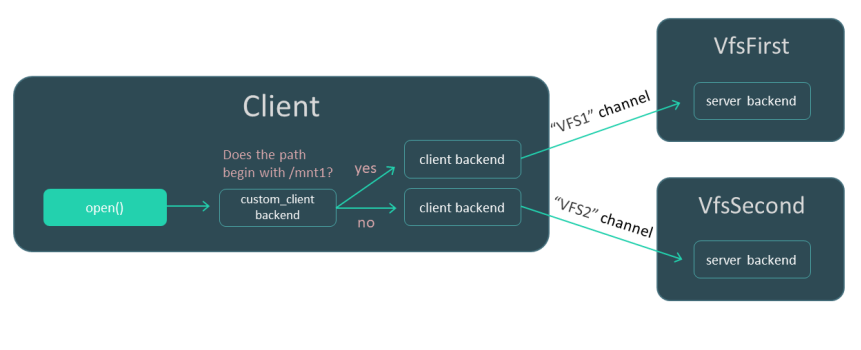Creating a VFS backend
This example demonstrates how to create and use a custom VFS backend.
The Client process uses the fat32 and ext4 file systems. The VfsFirst process works with the fat32 file system, and the VfsSecond process provides the capability to work with the ext4 file system. The environment variables of programs that run in the contexts of the Client, VfsFirst and VfsSecond processes are used to define the VFS backends ensuring that IPC requests of the Client process are handled by the VfsFirst or VfsSecond process depending on the specific file system being used by the Client process. As a result, IPC requests of the Client process related to use of the fat32 file system are handled by the VfsFirst process, and IPC requests of the Client process related to use of the ext4 file system are handled by the VfsSecond process (see the figure below).
On the VfsFirst process side, the fat32 file system is mounted to the directory /mnt1. On the VfsSecond process side, the ext4 file system is mounted to the directory /mnt2. The custom VFS backend custom_client used on the Client process side sends IPC requests over the IPC channel VFS1 or VFS2 depending on whether or not the file path begins with /mnt1. The custom VFS backend uses the standard VFS backend client as an intermediary.

Process interaction scenario
Source code of the VFS backend
This implementation file contains the source code of the VFS backend custom_client, which uses the standard client VFS backends:
backend.c
#include <vfs/vfs.h>
#include <stdio.h>
#include <stdlib.h>
#include <platform/compiler.h>
#include <pthread.h>
#include <errno.h>
#include <string.h>
#include <getopt.h>
#include <assert.h>
/* Code for managing file handles */
#define MAX_FDS 50
struct entry
{
Handle handle;
bool is_vfat;
};
struct fd_array
{
struct entry entries[MAX_FDS];
int pos;
pthread_rwlock_t lock;
};
struct fd_array fds = { .pos = 0, .lock = PTHREAD_RWLOCK_INITIALIZER };
int insert_entry(Handle fd, bool is_vfat)
{
pthread_rwlock_wrlock(&fds.lock);
if (fds.pos == MAX_FDS)
{
pthread_rwlock_unlock(&fds.lock);
return -1;
}
fds.entries[fds.pos].handle = fd;
fds.entries[fds.pos].is_vfat = is_vfat;
fds.pos++;
pthread_rwlock_unlock(&fds.lock);
return 0;
}
struct entry *find_entry(Handle fd)
{
pthread_rwlock_rdlock(&fds.lock);
for (int i = 0; i < fds.pos; i++)
{
if (fds.entries[i].handle == fd)
{
pthread_rwlock_unlock(&fds.lock);
return &fds.entries[i];
}
}
pthread_rwlock_unlock(&fds.lock);
return NULL;
}
/* Custom VFS backend structure */
struct context
{
struct vfs wrapper;
pthread_rwlock_t lock;
struct vfs *vfs_vfat;
struct vfs *vfs_ext4;
};
struct context ctx =
{
.wrapper =
{
.dtor = _vfs_backend_dtor,
.disconnect_all_clients = _disconnect_all_clients,
.getstdin = _getstdin,
.getstdout = _getstdout,
.getstderr = _getstderr,
.open = _open,
.read = _read,
.write = _write,
.close = _close,
}
};
/* Implementation of custom VFS backend methods */
static bool is_vfs_vfat_path(const char *path)
{
char vfat_path[5] = "/mnt1";
if (memcmp(vfat_path, path, sizeof(vfat_path)) != 0)
return false;
return true;
}
static void _vfs_backend_dtor(struct vfs *vfs)
{
ctx.vfs_vfat->dtor(ctx.vfs_vfat);
ctx.vfs_ext4->dtor(ctx.vfs_ext4);
}
static void _disconnect_all_clients(struct vfs *self, int *error)
{
(void)self;
(void)error;
ctx.vfs_vfat->disconnect_all_clients(ctx.vfs_vfat, error);
ctx.vfs_ext4->disconnect_all_clients(ctx.vfs_ext4, error);
}
static Handle _getstdin(struct vfs *self, int *error)
{
(void)self;
Handle handle = ctx.vfs_vfat->getstdin(ctx.vfs_vfat, error);
if (handle != INVALID_HANDLE)
{
if (insert_entry(handle, true))
{
*error = ENOMEM;
return INVALID_HANDLE;
}
}
return handle;
}
static Handle _getstdout(struct vfs *self, int *error)
{
(void)self;
Handle handle = ctx.vfs_vfat->getstdout(ctx.vfs_vfat, error);
if (handle != INVALID_HANDLE)
{
if (insert_entry(handle, true))
{
*error = ENOMEM;
return INVALID_HANDLE;
}
}
return handle;
}
static Handle _getstderr(struct vfs *self, int *error)
{
(void)self;
Handle handle = ctx.vfs_vfat->getstderr(ctx.vfs_vfat, error);
if (handle != INVALID_HANDLE)
{
if (insert_entry(handle, true))
{
*error = ENOMEM;
return INVALID_HANDLE;
}
}
return handle;
}
static Handle _open(struct vfs *self, const char *path, int oflag, mode_t mode, int *error)
{
(void)self;
Handle handle;
bool is_vfat = false;
if (is_vfs_vfat_path(path))
{
handle = ctx.vfs_vfat->open(ctx.vfs_vfat, path, oflag, mode, error);
is_vfat = true;
}
else
handle = ctx.vfs_ext4->open(ctx.vfs_ext4, path, oflag, mode, error);
if (handle == INVALID_HANDLE)
return INVALID_HANDLE;
if (insert_entry(handle, is_vfat))
{
if (is_vfat)
ctx.vfs_vfat->close(ctx.vfs_vfat, handle, error);
*error = ENOMEM;
return INVALID_HANDLE;
}
return handle;
}
static ssize_t _read(struct vfs *self, Handle fd, void *buf, size_t count, bool *nodata, int *error)
{
(void)self;
struct entry *found_entry = find_entry(fd);
if (found_entry != NULL && found_entry->is_vfat)
return ctx.vfs_vfat->read(ctx.vfs_vfat, fd, buf, count, nodata, error);
return ctx.vfs_ext4->read(ctx.vfs_ext4, fd, buf, count, nodata, error);
}
static ssize_t _write(struct vfs *self, Handle fd, const void *buf, size_t count, int *error)
{
(void)self;
struct entry *found_entry = find_entry(fd);
if (found_entry != NULL && found_entry->is_vfat)
return ctx.vfs_vfat->write(ctx.vfs_vfat, fd, buf, count, error);
return ctx.vfs_ext4->write(ctx.vfs_ext4, fd, buf, count, error);
}
static int _close(struct vfs *self, Handle fd, int *error)
{
(void)self;
struct entry *found_entry = find_entry(fd);
if (found_entry != NULL && found_entry->is_vfat)
return ctx.vfs_vfat->close(ctx.vfs_vfat, fd, error);
return ctx.vfs_ext4->close(ctx.vfs_ext4, fd, error);
}
/* Custom VFS backend builder. ctx.vfs_vfat and ctx.vfs_ext4 are initialized
* as standard backends named "client". */
static struct vfs *_vfs_backend_create(Handle client_id, const char *config, int *error)
{
(void)config;
ctx.vfs_vfat = _vfs_init("client", client_id, "VFS1", error);
assert(ctx.vfs_vfat != NULL && "Can't initialize client backend!");
assert(ctx.vfs_vfat->dtor != NULL && "VFS FS backend has not set the destructor!");
ctx.vfs_ext4 = _vfs_init("client", client_id, "VFS2", error);
assert(ctx.vfs_ext4 != NULL && "Can't initialize client backend!");
assert(ctx.vfs_ext4->dtor != NULL && "VFS FS backend has not set the destructor!");
return &ctx.wrapper;
}
/* Registration of the custom VFS backend under the name custom_client */
static void _vfs_backend(create_vfs_backend_t *ctor, const char **name)
{
*ctor = &_vfs_backend_create;
*name = "custom_client";
}
REGISTER_VFS_BACKEND(_vfs_backend)
Linking the Client program
Creating a static VFS backend library:
CMakeLists.txt
...
add_library (backend_client STATIC "src/backend.c")
...
Linking the Client program to the static VFS backend library:
CMakeLists.txt
...
add_dependencies (Client vfs_backend_client backend_client)
target_link_libraries (Client
pthread
${vfs_CLIENT_LIB}
"-Wl,--whole-archive" backend_client "-Wl,--no-whole-archive" backend_client
)
...
Setting the startup parameters and environment variables of programs
Init description of the example:
init.yaml
entities:
- name: vfs_backend.Client
connections:
- target: vfs_backend.VfsFirst
id: VFS1
- target: vfs_backend.VfsSecond
id: VFS2
env:
_VFS_FILESYSTEM_BACKEND: custom_client:VFS1,VFS2
- name: vfs_backend.VfsFirst
args:
- -l
- ahci0 /mnt1 fat32 0
env:
_VFS_FILESYSTEM_BACKEND: server:VFS1
- name: vfs_backend.VfsSecond
- -l
- ahci1 /mnt2 ext4 0
env:
_VFS_FILESYSTEM_BACKEND: server:VFS2
Page top